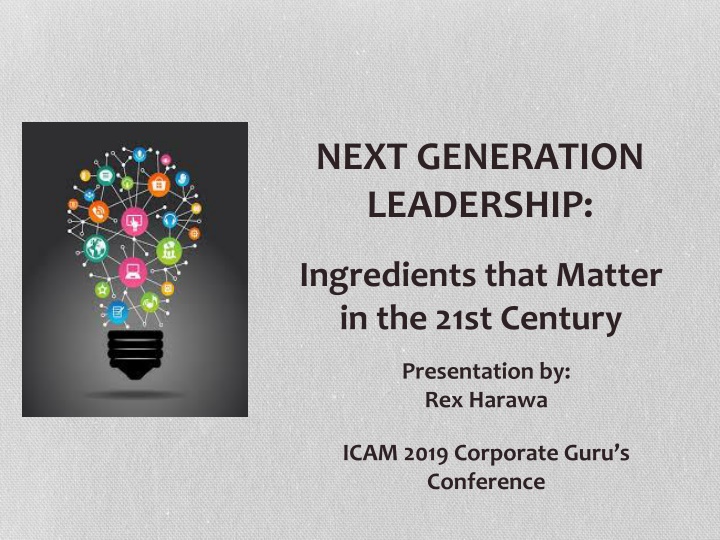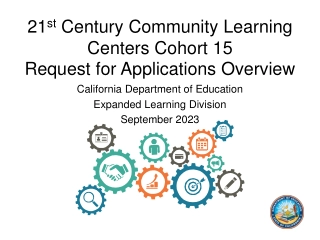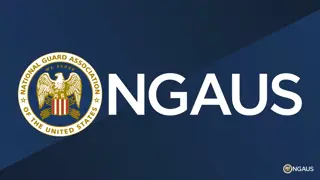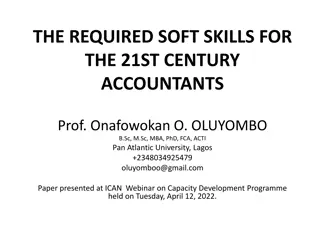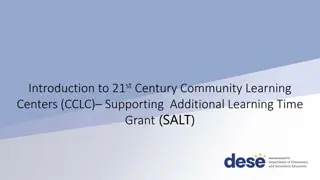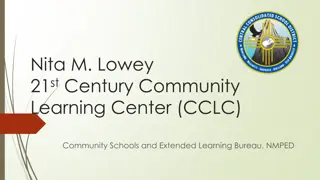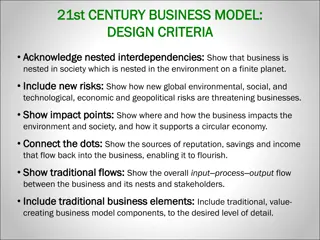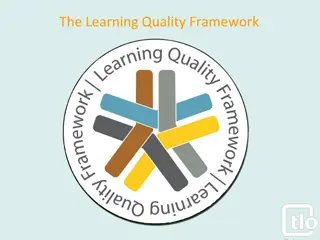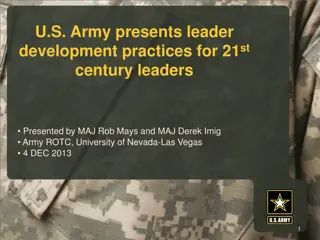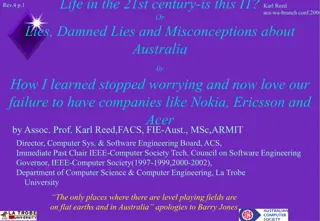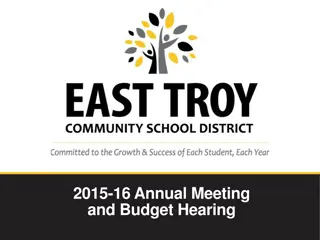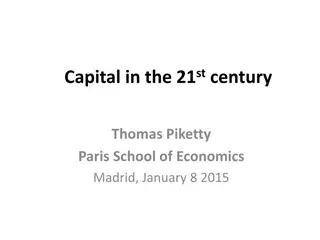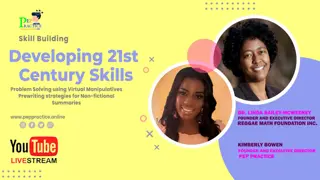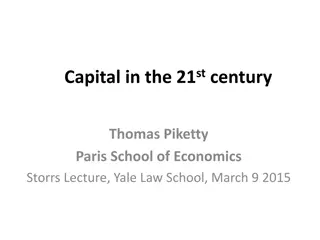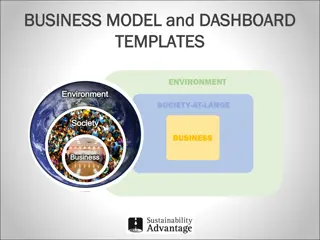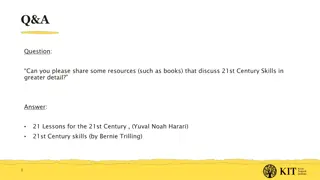Evolution of Leadership in the 21st Century
Life in the 1980s was characterized by predictable career paths based on academic degrees. The speaker reflects on how education in that era shaped individuals to fit specific roles in government or big corporations. He contrasts the limited options then with the diverse opportunities for leadership and success in today's world, emphasizing the need for adaptability and evolving skill sets. The presentation highlights the key ingredients crucial for next-generation leaders to thrive in the dynamic landscape of the 21st century.
Download Presentation

Please find below an Image/Link to download the presentation.
The content on the website is provided AS IS for your information and personal use only. It may not be sold, licensed, or shared on other websites without obtaining consent from the author.If you encounter any issues during the download, it is possible that the publisher has removed the file from their server.
You are allowed to download the files provided on this website for personal or commercial use, subject to the condition that they are used lawfully. All files are the property of their respective owners.
The content on the website is provided AS IS for your information and personal use only. It may not be sold, licensed, or shared on other websites without obtaining consent from the author.
E N D
Presentation Transcript
NEXT GENERATION LEADERSHIP: Ingredients that Matter in the 21st Century Presentation by: Rex Harawa ICAM 2019 Corporate Guru s Conference
I thank you for the opportunity to come and address you on this auspicious occassion: A gathering of the Country s young corporate gurus. It is an honour, and humbling to be in the company of the likes of: Nartha Mpinganjira, Steward Malata, Reyneck Matemba, Charles Kamoto, Tom Malata, and not forgetting our guest, Siphiwe Moyo. Chizuma, Dr Thom
Let me start with a story. I graduated from Chancellor College, University of Malawi in 1979, with a Bachelors Degree in Economics. Life in the 1980 s was a very predictable life. If you had an Economics Degree, you joined Government and became an Economist. If you had an Accounting Degree you joined one of the audit firms and became an auditor, or one of the manufacturing c0mpanies and became an Accountant. If you had a Science Degree, e.g Mathematics, Physics, Biology, you became a secondary school teacher
Life in the 1980s ... If you had a Degree in Public Administration, you joined Government and became an Administrator. If you had a Degree in Marketing, you joined Lever Brothers and became a Marketer. This was a very predictable life. You became what you were taught in College. College then imparted you with what was believed to be the key ingredients that mattered for you to succeed in life.
Life in the 1980s ... In terms of Companies, here in Malawi, we had a few big conglomerates that enjoyed massive monopolistic power and massive barriers to entry. We had: David Whitehead weaving and manufacturing cloth Carlsberg brewing Carsberg beer National Bank Banking Services Malawi Development Corporation Investment holding company PEW Limited assembling body trailers Import and Export Limited trading in fast moving consumer goods Malawi Railways providing rail transportation Deloitte Haskin and Sells providing audit services The best students in our classes ended up in these organizations.
Life in the 1980s ... In terms of Companies, in the World, at large, we also had a few big conglomerates that enjoyed massive monopolistic power and massive barriers to entry. We had, among the top 500 Companies: General Motors assebling and manufacturing cars IBM assembling computers Kodak manufacturing photographic firms Arthur Andersen Audit services Motown record label These companies were the most profitable and prestigious to work for.
Then came the 1990s ... The story of the 1990 s is an interesting story, dominated by new technologies: Laptop computers Mobile Phones Internet services MessagingServices These new technologies were called DISRUPTORS. They taught us and made us do things that were almost unthinkable, a decade, earlier.
Then came the 2000s ... The story of the 2000 s is even more interesting than that of the 1990s. The 2000 s saw the rise of a new breed of companies, that took the concept of market disruptors to the extreme. These companies used emerging technologies to create platforms from which they are now providing an amazing array of services Microsoft Retailer of publishing software, financial services, etc. Amazon Retailer of products and financial Services Ebay Retailer of products and financial services Uber Provider of taxi services and retailer of products Safaricom MobilepPhone services and financial services Samsung Manufacturer of phones, household appliances, etc., Facebook Provider of massaging services and financial services These new companies have left massive DISRUPTIONS in their wake. These companies have one thing in common: They are using technology to provide a broad range of services. These companies are not bound by the traditional restrictions that came with specialization. THE FUTURE IS DIGITAL!
So, let us, now talk of the next generation ... The other day, I was reading news on the BBC News website (www.bbc.co.uk). I was struck by a headline: FACEBOOK REVEALS DIGITALCURRENCY DETAILS This caught my interest. My first reaction was what is Facebook, the social media giant, up to? Being the inquisitive person that, I am, I also decided to visit the Facebook page of Mark Zuckerburg, the founder of Facebook.
FACEBOOK ... 2.38 billion monthly users 1.56 billion daily users (on average) stats as at March 31 2019
So,let us, now talk of the next generation ... I find this story of Facebook interesting. I think it does give us hints as to the key leadership ingredients that will matter in the 21st Century.
So, what is this Facebook story? ... Facebook is launching a new digitial currency, called, LIBRA, next year. Think of LIBRA as Mpamba or AirtelMoney Wallet, the only difference being that you can use your LIBRA units to trade across borders!!! With LIBRA you will be able to pay for your online purchases, transfer funds to your kids abroad, etc. Facebook is creating a GLOBAL CURRENCY!!!!
What can we learn from this story of Facebook? FOUR KEY LESSONS (call them Key Ingredients. ) 1. 2. HAVING AN OBJECTIVE 3. RESILIENCE/NEVER GIVE UP 4. BUILD TRUST COLLABORATION I strongly believe that these four key ingredients are critical leadership ingredients for the 21st Century.
INGREDIENT #1: COLLABORATION To launch this Global up/collaborating with big Silicon Valley players in payments and venture capital firms Currency, Facebook has teamed Payments firms such as Mastercard and PayPal Digital businesses incuding eBay, Spotify, and Uber Telecoms firms such as Vodafone Charities such as the microfinance group Women s World Banking FOUR KEY INGREDIENTS ... 1. 2. Have an Objective 3. 4. Collaboration Resilience Build Trust
INGREDIENT #2: HAVE AN OBJECTIVE So why is Facebook doing this? Facebook says LIBRA aims to serve the 1.7billion adults worldwide who do not have a bank account. In disproportionately affected people in developing countries, and in particular, women. particular it said .... the issue of unbanked FOUR KEY INGREDIENTS ... 1. 2. Have an Objective 3. 4. Collaboration Resilience Build Trust
INGREDIENT #3: RESILIENCE/NEVER GIVE UP This is not the first time that Facebook has dabbled in digital currencies. A decade ago, it created Facebook Credits, a virtual currency that enabled people to purchase items in apps on the social neworking site. Facebook ended the project after less than two years when it failed to gain traction. FOUR KEY INGREDIENTS ... 1. 2. Have an Objective 3. 4. Collaboration Resilience Build Trust
INGREDIENT #4: BUILD TRUST One of the reasons why Facebook Credits, failed is that other key payments players and users of social media applications did not trust Facebook Credits. To build trust in LIBRA, Facebook has been engaging with Governments, Central Banks and regulators, including officals from US Treasury and the Bank of England. FOUR KEY INGREDIENTS ... 1. 2. Have an Objective 3. 4. Collaboration Resilience Build Trust
IN CONCLUSION ... I strongly believe that these four key ingredients: 1. 2. 3. Resilience/Never Give Up 4. Build Trust Collaboration Have an Objective ... are key leadership ingredients that will matter in the 21st Century.
I thank ICAM for giving me the opportunity to presentation, this morning. make this Thank you for your attention.
